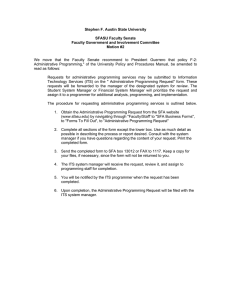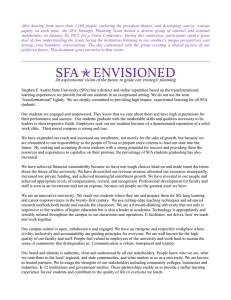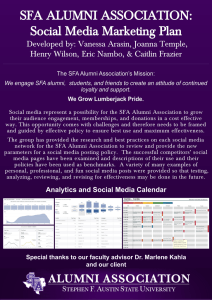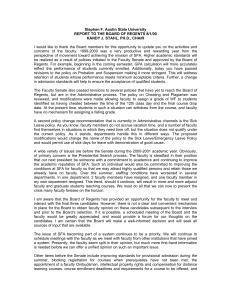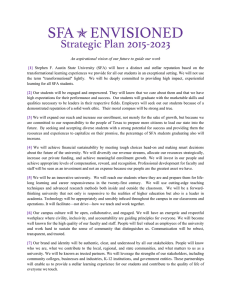Stephen F. Austin State University Faculty Senate Meeting Minutes
advertisement
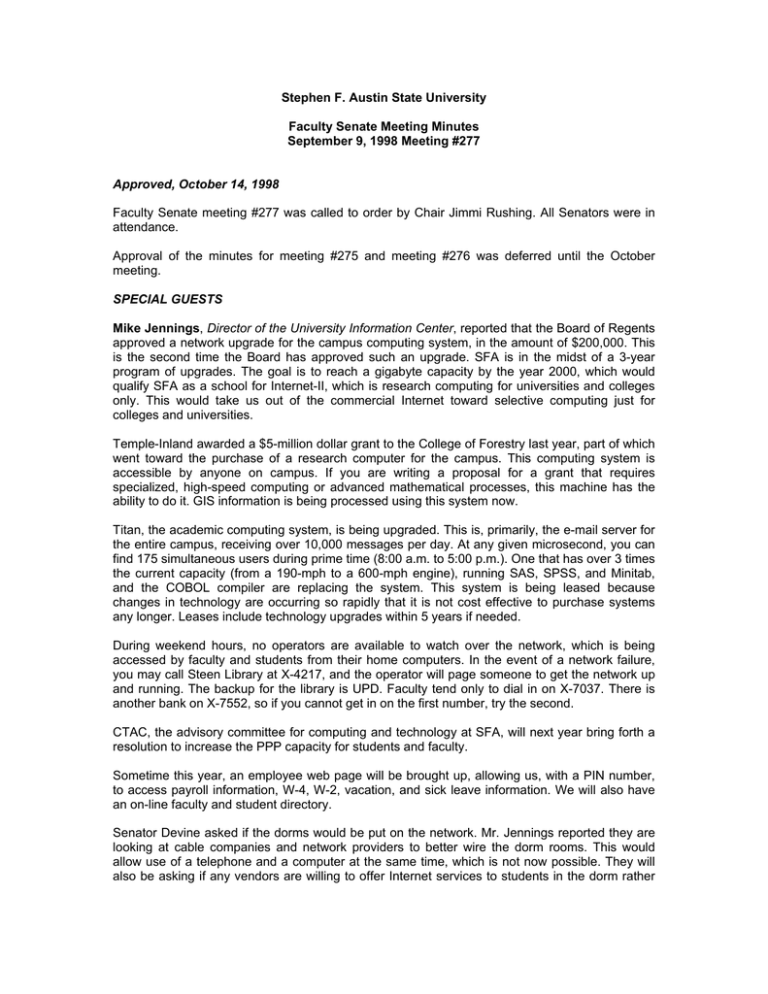
Stephen F. Austin State University Faculty Senate Meeting Minutes September 9, 1998 Meeting #277 Approved, October 14, 1998 Faculty Senate meeting #277 was called to order by Chair Jimmi Rushing. All Senators were in attendance. Approval of the minutes for meeting #275 and meeting #276 was deferred until the October meeting. SPECIAL GUESTS Mike Jennings, Director of the University Information Center, reported that the Board of Regents approved a network upgrade for the campus computing system, in the amount of $200,000. This is the second time the Board has approved such an upgrade. SFA is in the midst of a 3-year program of upgrades. The goal is to reach a gigabyte capacity by the year 2000, which would qualify SFA as a school for Internet-II, which is research computing for universities and colleges only. This would take us out of the commercial Internet toward selective computing just for colleges and universities. Temple-Inland awarded a $5-million dollar grant to the College of Forestry last year, part of which went toward the purchase of a research computer for the campus. This computing system is accessible by anyone on campus. If you are writing a proposal for a grant that requires specialized, high-speed computing or advanced mathematical processes, this machine has the ability to do it. GIS information is being processed using this system now. Titan, the academic computing system, is being upgraded. This is, primarily, the e-mail server for the entire campus, receiving over 10,000 messages per day. At any given microsecond, you can find 175 simultaneous users during prime time (8:00 a.m. to 5:00 p.m.). One that has over 3 times the current capacity (from a 190-mph to a 600-mph engine), running SAS, SPSS, and Minitab, and the COBOL compiler are replacing the system. This system is being leased because changes in technology are occurring so rapidly that it is not cost effective to purchase systems any longer. Leases include technology upgrades within 5 years if needed. During weekend hours, no operators are available to watch over the network, which is being accessed by faculty and students from their home computers. In the event of a network failure, you may call Steen Library at X-4217, and the operator will page someone to get the network up and running. The backup for the library is UPD. Faculty tend only to dial in on X-7037. There is another bank on X-7552, so if you cannot get in on the first number, try the second. CTAC, the advisory committee for computing and technology at SFA, will next year bring forth a resolution to increase the PPP capacity for students and faculty. Sometime this year, an employee web page will be brought up, allowing us, with a PIN number, to access payroll information, W-4, W-2, vacation, and sick leave information. We will also have an on-line faculty and student directory. Senator Devine asked if the dorms would be put on the network. Mr. Jennings reported they are looking at cable companies and network providers to better wire the dorm rooms. This would allow use of a telephone and a computer at the same time, which is not now possible. They will also be asking if any vendors are willing to offer Internet services to students in the dorm rather than going through the campus computer. Cost effectiveness is being researched now. Students would pay for this through their room fees or as an additional charge. Patsy Hallman spoke to the Senate regarding recent press release about the ExCET tests and the new accountability system in Texas. ExCET testing has been with us for over 10 years. Prior to this year, the accountability was based on overall student rating for that test. SFA has always had high overall test scores, and has always had national accreditation. The new accountability system, which began 9/1/98, includes overall test scores plus scores of selected groups identified by the state. We are accountable for each group, and for this reason SFA is now on the review list. Universities may be judged either by 1st-time test takers or by cumulative test-takers. In other words, we can be judged either by a 1-year period or a 2-year period. We do better using a 2year period because that includes students who have retaken the test (80% pass rate). Overall 93.45% passed the test. This year, we are being judged by females, males African-Americans, Hispanics, Other, and White. This year, we have a problem with the African-American scores (74.67%). We will be under review until they get an 80% on that score. 35 universities in Texas reviewed this kind of review. Several schools have scores below SFA and are not under review. This raises questions regarding the criteria that are used. SFA policies for eligibility to take the ExCET test are based on state policies (e.g., who can take it, when it can be taken). Last year it was determined that SFA might have a problem with some of the minority groups, and possibly the males. There is now an initiative to deal with these potential problems. This year, we know exactly who has not yet passed in each group. These students are offered a faculty mentor. SFA admission standards are comparable to the rest of the state training programs. Dr. Hallman reported that in her office, 212 Education Bldg., study guides for each teaching field for the ExCET test are available free of charge. Last year, practice tests were prepared for our students at a cost of $8000. The two most significant factors in the pass rate of an individual student is 1) his/her reading ability, and 2) whether he/she had a review for the test. At SFA, if students did not pass the practice test, they are brought in for reviews. Dean Franks addressed recent press releases. The cumulative pass rate reflects favorably on the entire university because it represents teaching fields and core curriculum courses as well as professional teaching courses. Therefore, every department on campus that plays a role in teacher training should take pride in that particular statistic. The majority of course work, by far, comes from departments other than those in the College of Education. Hence, these departments can share the glory of where we are, but also must share responsibility for areas where we need to improve. The headlines in the Daily Sentinel (i.e., "Teacher Education Program at SFA Not Up to State Standards") are alarming. This is a technically true statement, but the interpretation is of concern. Dean Franks stated that there is no cause for panic because the overall pass rate is quite good at SFA. With regard to accountability for the ExCET test, beginning in the year 2002 there will also be a column for each teaching field. Departments will have to work to align their curriculum with the ExCET objectives (e.g., capstone course in History). Dean Franks recommended that departments not wait until 2002 to accomplish this goal because we need the higher pass rate now. Dean Franks asked for help to improve the ExCET scores. We only needed 4 more tests passed to avoid being under review. He expects that 1 year from now, SFA will be accredited rather than accredited under review. Senator Codispoti asked how a student's university is determined. The form we received indicated several students who failed and were listed as SFA students yet graduated from another university, some of whom only took 3 credit hours at SFA. He questioned why we must take responsibility for students with minimal training at this university. Dr. Hallman responded that we are already protesting the system. The state requires that when a person holds a degree and comes to any institution in the state for teacher certification, the person must be allowed to enter if he/she has a 2.5 GPA and a degree from an accredited institution. The State Legislature is big on allowing students to go around the state and study. There is a larger teacher shortage in Texas this year than ever, so the state is pushing for certification of persons who already hold a degree. Dr. Hallman welcomed any faculty member who is interested to come and research the data to make a case or to help SFA work out the kinks in their accounting. All we can do at this time is to work within the system. Senator Sementelli stated his position that 1) if a student cannot pass the practice exam in his/her field of study, he/she should not be able to take the ExCET test at all, and 2) that we should not be responsible for a department losing training programs because of marginal students. Dr. Hallman stated that the current system forces us to group students, which is a disservice. Dr. Violet Rogers, Editor of the SACS Self-Study, updated the Senate on the report, which is proceeding at a steady pace. During the summer, the self-study plan was completed and mailed to the liaison at SACS and members of the steering committee. The first item for fall business is completion of department reports. Workshops have been held for writers of these reports and were well attended. The deadlines for the fall semester are as follows: 10/1/98 Report is due to department chairs 10/5/98 Report is due to the deans After review by the dean, reports will be forwarded to the steering committee, which will then get back to the department. University reports will start coming in in February. The report will be put together in the summer by Pat Russell and Violet Rogers. In the fall of 1999, the steering committee will edit further the final report and schedule SFA for a visit in the spring of 2000. If there are any questions, you may contact Violet Rogers. The web site has links to other institutional reports. Go through the SFA home page, through the faculty-staff home page, and look for the SACS link. This site includes the new mission statement approved by the Board of Regents in the summer. OFFICERS' REPORTS CHAIR Chair Rushing distributed reports in written form. They will go out via e-mail in the future to be read prior to the Senate meeting, then distributed in written form at the meeting for any discussion. She suggested that committee chairs do the same. Academic Affairs Council (6-10-98): There will be a maximum credit hour limit for undergraduates (170 hours) as the state will no longer reimburse universities beyond that limit. It is possible that students who exceed the limit will be charged out of state tuition. The rationale for this is the state wants students to start bearing some of the cost of education if they go beyond a certain point. If students begin a new degree program, the university will again be reimbursed by the state. All courses taken (including drops, Fs, repeats) will be counted in the 170 hour limit. This same situation exists for graduate students, with the limit being 130 credit hours. See the attached report from Chair Rushing for additional matters discussed in the Academic Affairs Council meeting. Academic Affairs (8-5-98): A 47-49 hour core curriculum has been proposed. Specific courses have not yet been proposed. Through state funding, the library has acquired Lexus Nexus that is available through the library web page. For additional issues covered in this meeting, please see the attached report from Chair Rushing. Board of Regents (7-98): see attached summary. Chair Rushing and Chair-Elect Simmons met with Dr. Angel and Dr. Angel last week. Dr. Angel requested that Sweat Equity be announced; it will be held on 9/12/98, with registration at the Coliseum. If it rains, work will be done inside. Participants will gather at 11:15 at the stadium for a group picture, followed by lunch and entertainment. The SFA birthday party will be held in the UC, 9/18/98, from 9:30 to 11:00. The report on admission standards should be available within a couple of weeks. Chair Rushing also reported we will have a draft of the '03 report in a few weeks. A question came up about grade replacement vs. grade averaging. We have always replaced a grade with a higher grade, but it has been suggested that we examine grade averaging. There is also a suggestion that students not be allowed to take a class more than twice. Chair Rushing reported a safety concern involving students crossing Starr from Pecan Park. The city will be contacted to see if anything can be done about a reduced speed limit or other solution to this concern. Chair Rushing invited senators to share any other safety issues that could be added to the list. Secretary Stahl expressed faculty concern related to poor lighting on campus at night. Senator Williford expressed similar concern, especially for females. Although UPD may be contacted for an escort, it takes a lengthy period of time for them to arrive. Hence, they are often not called. Senator Sementelli suggested we look into security lights through the city, which cost approximately $5 per month. Other Announcements: Faculty should review policies A-41 and D-13 so they are not in violation of policies when posting grades. As an update, the 5th Circuit upheld a temporary injunction in the expert witness laws. Treasurer Elliott-Howard explained that the state's position is that for any state employee to testify in court on behalf of a faculty member and against the state represents a conflict of interest. It was pointed out that this seems to affect faculty members' freedom of speech. The University of Texas system voted to appeal Hopwood v. Texas. There is a legislative mandate for a common college application form, which may be mandatory beginning in the fall of 1999. This is on the web site. See attached summary for other items of interest. TREASURER One bill remains to be paid from the 1997-1998 budget, for which there are sufficient funds available. The current balance in the Senate account is $5,094.00. COMMITTEE REPORTS ELECTIONS: Senator Williford reported there are currently two vacant Senate seats, one in Business and one in Education. Education is holding an election this week. Dr. Young is trying to get members of his college to fill the vacancy. The Grievance Panel will be put in place this semester according to Senator Williford. This is a reapportionment year, which means it will determine how many Senators are obtained from each area of the university. OLD BUSINESS Ad Hoc Committee on Admission Standards: This committee is a part of the Academic Affairs Committee. Senator Devine reported the committee is recommending 3 things at this time: 1) the administration protest the rules of TEA regarding the ExCET test accountability system, 2) faculty assist students in preparation for the ExCET test, and 3) no student should be allowed to take the ExCET test who is not prepared. Senator Devine will report further in the next Senate meeting. NEW BUSINESS Wellness Center: Questions have been raised about policy setting regarding usage of the Wellness Center. This has been assigned to the Faculty Government and Involvement Committee. Summer Teaching Assignments: Questions have been asked regarding summer teaching load assignments and how they are made. The Academic Affairs Committee has been assigned the task of discovery regarding departmental/university policies. Senator Codispoti reported that the policy requires every department develop individual policies concerning how they will handle situations where people have grants and ask for summer teaching assignments. Such requests must be forwarded to the dean of the college for approval, followed by approval from the VPAA. There is apparently nothing in the university policy regarding summer teaching in general. A call was made by Senator Devine for a possible university-wide policy to be examined. Issues include junior versus senior faculty being assigned classes, and full-time versus adjunct faculty receiving assignments. Concern was raised that such a policy could split faculty. Chair Rushing suggested that Senators poll their respective faculty for opinions regarding this issue and report back to Senator Codispoti. "Vanishing Professor": Chair Rushing reported on an article that stated more and more full-time faculty are disappearing from the classroom, and that replacements do not receive sufficient pay. Examination of this issue was assigned to the Professional Welfare Committee. Admission Policies: Senator Devine reported his ad hoc committee is looking into the work done by the consultant for SFA. Chair Rushing encouraged committees to invite faculty from outside the Senate to assist with committee work. She also is appointing a committee to plan SFA 75th anniversary activities sponsored by the Senate. Dr. Bennat Mullen has agreed to chair this committee. Irma Rangel, Chair of the House Higher Education Committee since 1995 has been asked to speak on campus. Sean Bradley, President of the SGA, is serving on the planning committee as well. The committee is in the process of trying to confirm a date in November or December, and examining the format for the event. Faculty volunteers are being sought. ADJOURNMENT Senator Florence Elliott-Howard moved that the meeting be adjourned; Senator Mann seconded the motion. The motion was carried; the meeting adjourned at approximately 4:30 p.m. Kandy J. Stahl Secretary Chair's Report, September 9, 1998: Academic Affairs, June 10, 1998 *Discussed the new maximum credit hour limit (170 hours) for undergraduate students. SFA will need a policy regarding any additional tuition charged to students who exceed the limit. A statement regarding credit hours needs to be added to the next edition of the General Bulletin. *Heard a report from Roger Bilow, Director of Admissions, on academic advising during orientation sessions. Mr. Bilow noted that 3 hour development courses for TASP and Math Placement DO NOT count towards the 30 hours needed in fall and spring to qualify for the second year of the Academic Excellence Scholarship. *Heard a report from Dennis Jones, Registrar, on registration. Mr. Jones reported that 465 students registered during Orientation I and 45% of those registered via the web. *It was also reported that there was a problem with the Acuplacer, so computerized testing would be discontinued for the remainder of the summer. They will use paper/pencil tests. It was also noted that the TASP minimum passing math score is 270 in order to be exempt from taking a mathe developmental course. *Core Curriculum mandates were briefly discussed. It will be returned to the agenda for future discussion. *Reviewed policies E-13 (Duties and Responsibilities of Offices Reporting to the Vice-President for Academic Affairs; no action required.); A-12 (Copyrighted Works Reproduction; changes approved); and A22.1 (Instructor Generated Materials; edited and approved.) Return to text Chair's Report, September 9, 1998: Academic Affairs Council, August 5, 1998 *Distributed: 1) updated Trienniel evaluation chart [to be distributed at Senate meeting, September 9] 2) three amendments by the Coordinating Board relative to distance learning and the core curriculum [on file in Senate office] September 8, 1998 *Announcements: ** September 12 is SweatEquity Day. **Reminder that students can register via the web through any computer on campus, not just the kiosks in the Library and University Center. **Ralph W. Steen Library has acquired a modified version of LEXIS-NEXIS at greatly reduced pricing through the TexShare program. The Library=s electronic newsletter will offer more details. [You can also contact your subject librarian!] **Dean Speer will chair the SACS Institutional Effectiveness Committee. **June ExCET test results placed the Education program in a status of "accredited-under review". SFA had a 93.45% cumulative pass rate for all students, and only one small demographic group fell below the cut-off by 4 tests. [Dr. Patsy Hallman, Associate Dean, College of Education, will be present at the September 9 Faculty Senate meeting for a brief update and to answer any questions.] *The Educational Programs Committee of the Council presented a proposal for a 47-49 hour core curriculum as mandated by the Texas State Legislature. It follows guidelines established by the Coordinating Board. The core recommended also closely follows the recommendations of the 1997 SFA Core Curriculum Committee. Communication 12 - 14 hours * 6 hours must be English (English rhetoric, composition, business communication, technical writing, communication, foreign language) Mathematics 3 hours Natural Sciences 8 hours (includes physical sciences) Humanities 6 hours *3 hours must be visual/performing arts (literature, history philosophy, visual and performing arts) Social and Behavioral Science 15 hours *6 hours must be U.S. History (3 hours of this may be Texas History); 6 hours must be Political Science Institutionally designated option 6 hours (health, physical activity, computer literacy TOTAL 47-49 hours The 1997 SFA Core Curriculum Committee also recommended that a General Education Committee be established to provide oversight and continuous assessment of the courses in the core curriculum. The Educational Programs Committee of the Council recommended that the Academic Affairs Council serve as the oversight committee. Further recommendations regarding specific SFA courses to be included in the core curriculum will be presented at the next meeting. *Regarding Policy A-12, Copyrighted Works Reproduction, it was noted that that copies of copyrighted material cannot be used repeatedly as reserve material in the library; they may only be put on reserve once without securing publisher permission. There will be a memo sent to faculty stating the need for publisher permission prior to placing copies on reserve more than once. *A new policy, Selection of Academic Deans, was referred to the Educational Program Committee, chaired by Dean Young. *Policies E-50A, Tenure, E-51A; Tenure Awards, and E-20A, Evaluation, Merit Pay; Promotion and Tenure were referred to the Educational Program Committee. The Faculty Senate will be included in the review of these policies. *Policy A-02, Academic Complaints by Students, was reviewed by the Students Committee (Dean. Franks, Chair); a revision has been recommended by the Faculty Senate. *Policy A-45, Transfer Credits, was assigned to the Students Committee. (Dean. Franks, Chair) *Policies E-24A, Faculty Search (unpublished) and A-18, Faculty Workload, were assigned to the Faculty and Administration Committee. (Dr. Jeffrey, Chair) *The Students Committee will review the University Scholars scholarship program. Return to text Chair's Report, September 9, 1998: Board of Regents meeting, July 13-14, 1998 *Appointed 21 new faculty in 13 departments among all colleges; including 1 new department chair, Dr. Russell Cluff, Modern Languages. *Approved the holiday schedule for 1998-1999, including 14 holidays. SFA will close from December 24-January 3 and from March 14-March 22 (staff will take 2 vacation days). Other holidays include: September 7, November 26-27, May 31. *Approved graduate application fee ($25) for Counseling (all programs), Forestry (all programs), Interdisciplinary Studies, Social Work, Secondary Education & Educational Leadership (all programs and Speech Pathology. *Approved a name change from the Department of Counseling and Special Education to the Department of Human Services. *Approved the new mission statement (http://www.sfasu.edu/research/sfamiss.htm) *Approved funding ($200,000) for phase two of a three year plan to upgrade and expand the existing Local Area Network as a prerequisite to achieving a 100 megabit network as outlined in a long range plan to the Texas Department of Information Resources. Includes replaced of old technology network equipment, expansion of fiber optic backbone cabling and intra-building segmentation needed to meet the requirements of a high speed network. *Approved replacement of the Central Academic Computer with lease/purchase. This computer supports the computer science department, campus e-mail, and social science & statistics research. [Mike Jennings, Director, University Information Systems, will be a guest and speak to these improvements at the beginning of the Senate meeting.] *Approved replacement of the University Mini-Bus (the current one is a 1986 model with 170,000 miles!) *Approved 1998-99 HEAF (Higher Education Assistance Funds) of $6,468,273. $500,000 was budgeted for contingencies, $1.162 million for library materials, and $1.1 million for the Miller Science building renovation. *Authorized the Board of Regents= Building Committee to review bids and proceed with the renovation of the Miller Science building. *Approved $160,000 for the renovation of Central Stores. *Approved the naming of the Patricia and Adeline Mast Arboretum, the Ed and Gwen Cole Concert Hall, and the Jimmy W. Murphy Wellness Center. *Approved policy revisions, including a new policy for Instructor Generated Materials (A22.1). *Heard a report from Personnel in which it was recommended that all employees, including classified and non-classified staff be on a merit pay raise system. Return to text Chair's report, September 9, 1998: Other announcements/items of interest *Faculty should review University Policy A-41, Semester Grades, and D-13, Student Records. These policies have been updated. It is violation of University Policy to post grades by Social Security number and also, in violation of "FERPA" (The Family Educational Rights and Privacy Act of 1974) D-13 The purpose of this policy is to comply with federal law which: (1) grants to students the right of access to their education records, (2) protects students from illegal use of their education records, (3) restricts the disclosure of the social security account number of students…. 14. Disclosure of Social Security Account Number Federal law requires that when any federal, state or local government agency requests an individual to disclose his/her social security account number (SSAN), that individual must also be advised whether that disclosure is mandatory or voluntary, by what statutory or other authority the number is solicited, and what uses will be made of it. Accordingly, students, or applicants for admission as students, are advised that disclosure of a student's SSAN is mandatory as a condition for participation in certain activities at the University. A-41 Grades may be posted only with the written permission of the student and then must be done so in a manner that an individual student's grade can not be identified by others. *Fifth Circuit upheld a temporary injunction in the expert witness rider lawsuit filed by the Texas Faculty Association and Dr. Robert Hoover, a Texas A&M - Corpus Christi professor against Texas Attorney General Dan Morales and Texas A&M University System. (July 28) *Board of Regents of the University of Texas System voted to appeal Hopwood v.Texas (May 14) *Texas Commission on a Representative Student Body had its final meeting on Monday, August 24th and formulated recommendations regarding Financial Aid, Recruitment, Transferability, and Retention. A report will be released to the media and interested parties during a press conference on Thursday, October 15, at 10am in the State Capitol. (TexFac) **The Commission also endorsed the concept of a marketing communication plan. **Contact the Commission's chair, former Lt. Governor Bill Hobby, at hobby@uh.edu or 713-5213596. *Common application for Texas institutions of higher education is now up and running. http://www.applytexas.org. 20 institutions are signed on and are participating in the use of the web site. The cost is begin prorated out to the institutions. There is an 'early warning' about the 170 hour rule. *Meetings: **Coordinating Board Advisory Committee on Core Curriculum met on September 3. DB contact: Dr. Catherine Parsoneault, (512) 463-6214. **Coordinating Board Advisory Committee on Distance Education will meet on September 9. CB contact: Dr. Paul Meyer, (512) 483-6200. **House Appropriations Committee will be on September 16 at 8am in the State Capitol Extension, Room E1.030, to consider and vote on interim subcommittee reports, including recommendations on the evaluation of performance-based budgeting and strategic planning for higher education. **House Higher Education Committee will hold hearings on September 23 and 24 at 9am each day in Room E2.010, Capitol Extension. The committee will focus on projected enrollment increases and how the state's institutions will respond. **There is a draft report on faculty workload goals being finalized by an advisory committee to the Coordinating Board. Rider 38, Page II_51, Appropriations Act directed the CB staff to develop faculty workload goals. [More information on file in Senate office] Return to text
